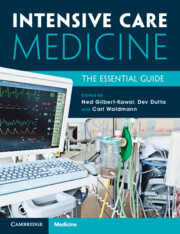Book contents
- Intensive Care Medicine
- Intensive Care Medicine
- Copyright page
- Dedication
- Dedication
- Epigraph
- Contents
- Contributors
- Preface
- Foreword
- Abbreviations
- Section 1 Resuscitation and Management of the Acutely Ill Patient
- Introduction
- Chain of Survival
- Leadership
- Practical Leadership Issues
- Technical
- Special Circumstances
- Cessation of CPR
- National Audit and Training
- Introduction
- Post-cardiac Arrest Syndrome
- Airway and Breathing
- Circulation
- Disability
- Exposure
- Prognostication and Organ Donation
- Introduction
- Considerations When Triaging
- Admission to ICU Ideals
- Discharge Planning
- Department of Health Guidelines 2000/Updated Review 2011
- Introduction
- Pre-arrival Preparation
- The Primary Survey
- Secondary Survey
- Consideration for the Need to Transfer
- The Multiple Injured Patient – Early Total Care versus Damage Control Surgery
- Conclusion
- Assessment
- Estimating Burn Depth and % TBSA
- Severe Burns
- Initial Management
- Acknowledgements
- Definitions
- Planning
- Principles of Treatment in a Mass Casualty Incident
- Declaration of a Mass Casualty Incident
- Command and Control
- Preparing for Arrival of Casualties
- Lessons from Previous Incidents
- 1.1 General Introduction to the Recognition, Assessment and Stabilisation of the Acutely Ill Patient with Disordered Physiology
- 1.2 Management of Cardiopulmonary Resuscitation – Advanced Life Support
- 1.3 Principles of Management of the Patient Post-resuscitation
- 1.4 Principles of Triaging and Prioritising Patients Appropriately, Including Timely Admission to ICU
- 1.5 Initial Assessment and Management of the Trauma Patient
- 1.6 Principles of Assessment and Initial Management of the Patient with Burns
- 1.7 Description and Management of Mass Casualties
- Section 2 Diagnosis, Assessment, Investigation, Monitoring and Data Interpretation
- Domain 3 Disease Management: Recognition, Causes and Management
- Section 4 Therapeutic Interventions and Organ Support
- Domain 5 Practical Procedures
- Section 6 Perioperative Care
- Section 7 Comfort and Recovery
- Section 8 End-of-Life Care
- Section 9 Paediatric Care
- Section 10 Transport
- Section 11 Professionalism, Patient Safety, Governance and Health Systems Management
- Index
- References
1.7 - Description and Management of Mass Casualties
from Section 1 - Resuscitation and Management of the Acutely Ill Patient
Published online by Cambridge University Press: 27 July 2023
- Intensive Care Medicine
- Intensive Care Medicine
- Copyright page
- Dedication
- Dedication
- Epigraph
- Contents
- Contributors
- Preface
- Foreword
- Abbreviations
- Section 1 Resuscitation and Management of the Acutely Ill Patient
- Introduction
- Chain of Survival
- Leadership
- Practical Leadership Issues
- Technical
- Special Circumstances
- Cessation of CPR
- National Audit and Training
- Introduction
- Post-cardiac Arrest Syndrome
- Airway and Breathing
- Circulation
- Disability
- Exposure
- Prognostication and Organ Donation
- Introduction
- Considerations When Triaging
- Admission to ICU Ideals
- Discharge Planning
- Department of Health Guidelines 2000/Updated Review 2011
- Introduction
- Pre-arrival Preparation
- The Primary Survey
- Secondary Survey
- Consideration for the Need to Transfer
- The Multiple Injured Patient – Early Total Care versus Damage Control Surgery
- Conclusion
- Assessment
- Estimating Burn Depth and % TBSA
- Severe Burns
- Initial Management
- Acknowledgements
- Definitions
- Planning
- Principles of Treatment in a Mass Casualty Incident
- Declaration of a Mass Casualty Incident
- Command and Control
- Preparing for Arrival of Casualties
- Lessons from Previous Incidents
- 1.1 General Introduction to the Recognition, Assessment and Stabilisation of the Acutely Ill Patient with Disordered Physiology
- 1.2 Management of Cardiopulmonary Resuscitation – Advanced Life Support
- 1.3 Principles of Management of the Patient Post-resuscitation
- 1.4 Principles of Triaging and Prioritising Patients Appropriately, Including Timely Admission to ICU
- 1.5 Initial Assessment and Management of the Trauma Patient
- 1.6 Principles of Assessment and Initial Management of the Patient with Burns
- 1.7 Description and Management of Mass Casualties
- Section 2 Diagnosis, Assessment, Investigation, Monitoring and Data Interpretation
- Domain 3 Disease Management: Recognition, Causes and Management
- Section 4 Therapeutic Interventions and Organ Support
- Domain 5 Practical Procedures
- Section 6 Perioperative Care
- Section 7 Comfort and Recovery
- Section 8 End-of-Life Care
- Section 9 Paediatric Care
- Section 10 Transport
- Section 11 Professionalism, Patient Safety, Governance and Health Systems Management
- Index
- References
Summary
Key Learning Points
1. Read and understand your organisation’s mass casualty plan. Know your role.
2. Plan for a surge in patients, and understand how additional capacity may be created.
3. Anticipate communication difficulties, and introduce redundancies to mitigate this risk.
4. Additional staff will be required for days to weeks afterwards.
5. Care for the physical and psychological health of your staff.
- Type
- Chapter
- Information
- Intensive Care MedicineThe Essential Guide, pp. 18 - 20Publisher: Cambridge University PressPrint publication year: 2021



